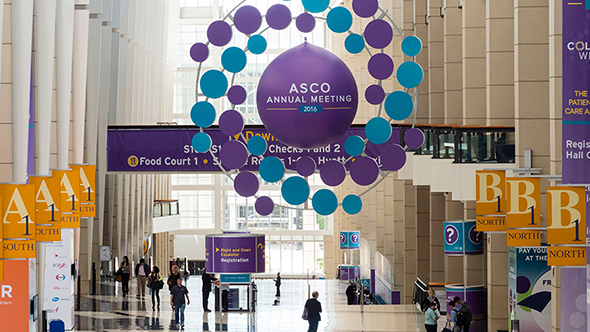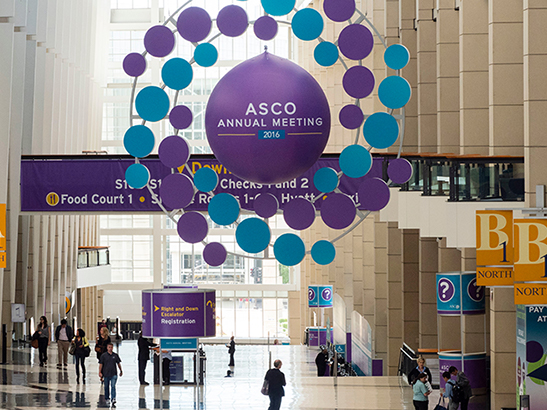
The American Society for Clinical Oncology (ASCO) Annual Meeting 2016 was held in Chicago, US (photo: ASCO/Todd Buchanan 2016)
The American Society for Clinical Oncology (ASCO) Annual Meeting is the most important event in the cancer calendar, bringing together 30,000 scientists and clinicians from around the world to discuss the latest research in state-of-the-art treatments, exciting new therapies and patient care.
The theme of this year’s conference, held in Chicago, US on 3–7 June 2016, was based around ‘Collective Wisdom: The Future of Patient-Centered Care and Research’, and this key message echoes The Institute of Cancer Research’s commitment to team science.
The most complex and challenging research problems will need scientists working together in multidisciplinary teams to bring together different ideas, skill sets, expertise and ways of working. This is central to our work at the ICR to accelerate the transformative impact that breakthrough research can have on cancer care and treatment.
Personalised medicine
One such problem is personalising cancer treatment to the unique characteristics of each patient’s cancer, and this was a major talking point at ASCO this year.
The ICR has been at the forefront of personalised treatments for cancer. We’ve developed drugs that target specific cancer causing mutations like the breast cancer drug Olaparib, which targets mutations to a gene called BRCA. But cancer can evolve and adapt to overcome treatments, so we need to work harder, and smarter to beat cancer.

A number of ICR scientists were present at his year's conference (photo: ASCO/Todd Buchanan 2016)
Speaking to the Daily Mail from ASCO, ICR researcher Professor Johann de Bono, Head of the ICR’s Division of Clinical Studies, said: "It's no longer just thinking about whether the cancer has come from the breast or the bowel or the lung. There's more to it than that.
“We can now look at their tumour by genomic testing and if we identify what we call ‘actionable genomic aberrations’ we can use that to decide what drug to give the patient.”
ICR researchers were involved with a number of personalised cancer treatment studies at ASCO this year, including investigations to match targeted therapies to patients with breast cancer in clinical trials and an early stage trial for a drug that targets genetic mutations of two signalling pathways called MEK and RAF, which can be faulty in some solid tumours.
'Staggering progress'
Dr Udai Banerji, a Reader in Molecular Cancer Pharmacology at the ICR, worked with colleagues at The Royal Marsden NHS Foundation Trust to investigate whether this new dual MEK/REF inhibitor could treat patients with diseases such as lung cancer, colorectal cancer and ovarian cancer with mutations to the genes KRAS, NRAS or BRAF.
The preliminary results found seven out of eight patients with KRAS mutated non-small cell lung cancer responded positively to the drug, which is really encouraging because there are no personalised treatments for this form of lung cancer.
Dr Timothy Yap, Clinician Scientist at the ICR and Consultant Medical Oncologist at The Royal Marsden, led a follow-up study investigating outcomes for patients with advanced breast cancer who take part in early stage clinical trials at the joint ICR and Royal Marsden Drug Development Unit. Patients are regularly placed on trials for novel anti-tumour treatments after conventional treatments have failed.
.jpg)
The ASCO conference draws over 30,000 scientists and clinicians from around the world each year (photo: ASCO/David Eulitt 2016)
His research found that patients do better when trials match treatments targeting specific mutations to the genetic make-up of patients’ tumours, compared with unmatched trials.
Dr Yap said: “This is my 10th year at ASCO and it is staggering how much progress the oncology field has made over this time in terms of precision medicine and novel therapeutics.
“Looking to the future in lung cancer and drug development, it is likely that anti-tumour strategies will be to look beyond immune checkpoint inhibitors by developing rational combination approaches, modern vaccines and engineered T cell therapies."
By identifying patients likely to benefit from targeted treatments, and also those who won’t, personalised medicine could save both time and money, and improve outcomes for patients with cancer.
